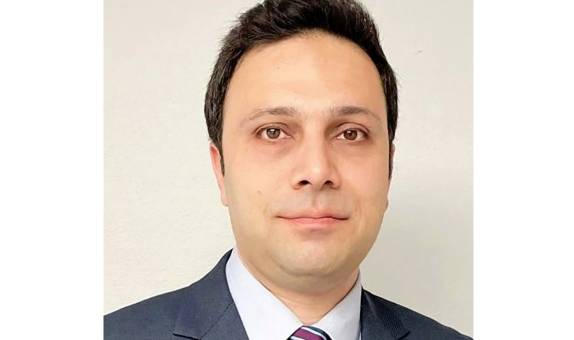Electronics and Robotics MSc
Why choose this course?
On this MSc course you will learn how to design, build, and program robots with advanced electronics components, such as sensors, microcontrollers, and actuators. You will learn how to use electronic devices and components to sense the environment, control the motion of the robot, and integrate the various subsystems of the robot.
The course covers a wide range of topics, including sensor design, control systems and embedded systems among others. You will learn to program microcontrollers, design circuits, and use simulation tools to model and test their designed robots. You will also gain practical experience in building and testing robotic systems, allowing them to apply their knowledge in real-world scenarios.
| Mode | Duration | Start date |
|---|---|---|
| Full time | 1 year |
September January |
| Full time | 2 years including professional placement |
September January |
| Part time | 2 years |
September January |
| Main Location | Roehampton Vale |
Reasons to choose Kingston University
- Gain hands-on experience in designing, building, and programming robot electronics that make robots more flexible, intelligent, and capable.
- The demand for skilled professionals in a wide range of industries is only set to increase, making this course an excellent choice for students who are interested in pursuing a career in robotics and autonomous systems.
- Opportunities to work on real-world problems and projects.
What you will study
Modules
Professional placement
Core modules
Electronics and Robotics Integration
15 credits
This module offers a comprehensive exploration of the synergy between electronics and robotics, encompassing essential components such as microcontrollers, sensors, motors, and sustainability considerations. This module combines theoretical knowledge with practical applications to empower students with a deep understanding of electronic systems' pivotal role in contemporary robotics. You will delve into topics ranging from the fundamentals of electronics to advanced sustainable practices in robotics design, equipping you with versatile skills for the ever-evolving field of robotics.
Industrial Robotics
15 credits
This module provides high level view on the design of mechatronic and automation systems. Applications and types of such systems are discussed. Main components of mechatronic design are introduced, including mechanical design through specialised software, sensors and actuators, control design, and software development for real-time implementation. Theoretical material is illustrated by practical laboratory sessions on real-time design, using industrial standard, state-of-the-art equipment. A range of transferable skills gained in this module is aimed to help with your work on your final project and extra-curricular activities available within the school.
Machine Learning
15 credits
The module introduces fundamental concepts and methods in Machine Learning and discusses their applications in smart mechatronic systems. You are firstly introduced to classical methods before they are taught modern state-of-the-art AI approaches. The module is taught in a practical fashion and therefore some knowledge of a programming language is required. This Machine Learning module, through its practical focus on smart mechatronic systems, empowers students with digital competency and creative problem-solving skills. Engaging with both classical and state-of-the-art AI approaches cultivates a questioning mindset and adaptability. The coursework encourages collaboration and resilience as you tackle complex real-world problems like autonomous driving. Regular feedback promotes self-awareness, and an enterprise mindset is fostered through real-world problem solving.
Sensors, Actuators and Embedded Systems
30 credits
The module offers a comprehensive exploration of fundamental concepts and practical applications related to sensors, actuators, and embedded systems in the context of mechatronics and robotics. You will delve into the intricate world of electronics, focusing on the critical components that drive autonomous systems. The module combines theoretical knowledge with hands-on projects, providing you with a strong foundation in the design, implementation, and optimization of sensor-driven mechatronic systems. This module will provide you with a solid foundation in the electronics and embedded systems aspects of mechatronics and robotics, preparing you for the challenges of designing and developing sensor-driven autonomous systems.
Research Techniques, Innovation and Sustainability
30 credits
Research Techniques, Innovation and Sustainability equips you with the skills and knowledge required to select and justify a research topic and then to plan and execute that research project. Research is a broad topic covers a variety of activities that range from undertaking a project as part of an academic programme, through research and development in the commercial environment, to acquiring information to inform projects undertaken as part of routine business practice. This module introduces research in these contexts and allows you to develop your own research plan. As part of the module, you will consider setting research questions and determining hypotheses, acquire relevant information and data, apply suitable analytical techniques, and evaluate the significance and potential applications of their research findings. You will also develop your innovation skills through a combination of workshops and team working, resulting in submission of an innovation proposal aimed to address UN Sustainable Development Goal 11, Sustainable Cities and Communities.
The module covers many practical aspects surrounding research in the commercial environment including intellectual property and professionalism, and sustainability is embedded throughout the module both in course content and via development of the innovation proposal.
Dissertation
60 credits
Drawing on previous knowledge and experience, the dissertation module allows you to study an area of interest within your chosen field in significant depth. In undertaking the dissertation, you will develop not only a deeper understanding of your subject area but will also be able to demonstrate a high level of autonomy in terms of project dissertation planning and management. You will be able to demonstrate knowledge and competence in reviewing existing published literature and data and, through your own efforts, apply one or more of a range of research methods to collect and analyse data and draw well-founded conclusions as a result of your research. The main output from the module is a final report but the option is available for you to prepare their work in the format of an article suitable for submission to a relevant conference or journal.
Optional modules
Human Robot Interaction
15 credits
This module provides you with the knowledge of the basic principles of human-robot interaction (HRI), exploring the fundamentals of a new area of research related to robotics, focusing on the physical, cognitive, and social interaction between humans and robots. This module aims to provide you with a comprehensive understanding of HRI principles, theories, and practical applications. You will learn to design, evaluate, and implement effective HRI systems that enable seamless communication and collaboration between humans and robots.
Applied Deep Learning
15 credits
This module is designed to expand your knowledge and skills in the fields of artificial intelligence, in particular, deep learning applied to robotic applications. The module covers a range of topics, including Convolutional Neural Networks (CNNs), Deep Reinforcement Learning (DRL) and Recurrent Neural Networks (RNNs). You will gain a deeper understanding of how to design and implement robotic systems that can perform complex tasks efficiently and intelligently such as responding to human behaviour and navigating autonomously in complex and dynamic environments.
Professional placement
Professional Placement
120 credits
The Professional Placement module is a core module if you're following a masters programme that incorporates an extended professional placement. It provides you with the opportunity to apply your knowledge and skills in an appropriate working environment, and develops and enhances key employability and subject specific skills in your chosen discipline. You may wish to use the placement experience as a platform for a major project or your future career.
It is your responsibility to find and secure a suitable placement opportunity; this should not normally involve more than two placements which must be completed over a minimum period of 10 months and within a maximum of 12 months. The placement must be approved by your Course Leader prior to commencement to ensure its suitability. You will have access to the standard placement preparation activities offered by the Student Engagement and Enhancement (SEE) group.
Read more about the postgraduate work placement scheme.
Department of Electrical, Electronic and Robotic Engineering
Work placement scheme
Many postgraduate courses at Kingston University enable students to take the option of a 12-month work placement as part of their course. Although the University supports students in finding a placement and organises events to meet potential employers, the responsibility for finding the work placement is with the student; we cannot guarantee the placement, just the opportunity to undertake it. You may find securing a professional placement difficult as they are highly competitive and challenging, but they are also incredibly rewarding. It is very important to prepare and apply yourself if this is the route you wish to take. Employers look for great written and oral communication skills and an excellent CV/portfolio. As the work placement is an assessed part of the course, it is covered by a student's Student Route visa.
Find out more about the postgraduate work placement scheme.
Entry requirements
Teaching and assessment
Who teaches this course?
Facilities
There is a wide range of facilities for practical work at our Roehampton Vale campus, where this course is based. You will have access to a modern environment with the latest technology and industry-standard equipment.
Course fees and funding
Here you can find more details about fees for this course, as well as any funding opportunities available to you for this course. Please note that fees relate to the academic year in question and will increase in future years.
If you require a Student Route visa to reside in the UK you may not be able to enrol on a part-time programme at the University.
Kingston University has carefully considered the Student Route visa and has decided not to offer Student Route visa part-time study. Student Route visa sponsorship is only available to students studying on a full-time course.
Additional costs
Depending on the programme of study, there may be extra costs that are not covered by tuition fees which students will need to consider when planning their studies. Tuition fees cover the cost of your teaching, assessment and operating University facilities such as the library, access to shared IT equipment and other support services. Accommodation and living costs are not included in our fees. Where a course has additional expenses, we make every effort to highlight them. These may include optional field trips, materials (e.g. art, design, engineering), security checks such as DBS, uniforms, specialist clothing or professional memberships.
After you graduate
You will be well equipped to work in a variety of industries that are rapidly adopting automation and robotics technology, such as manufacturing, healthcare, logistics, and transportation. You will also be able to contribute to cutting-edge research in the field of robotics.
Course changes and regulations
The information on this page reflects the currently intended course structure and module details. To improve your student experience and the quality of your degree, we may review and change the material information of this course. Course changes explained.
Programme Specifications for the course are published ahead of each academic year.
Regulations governing this course can be found on our website.







